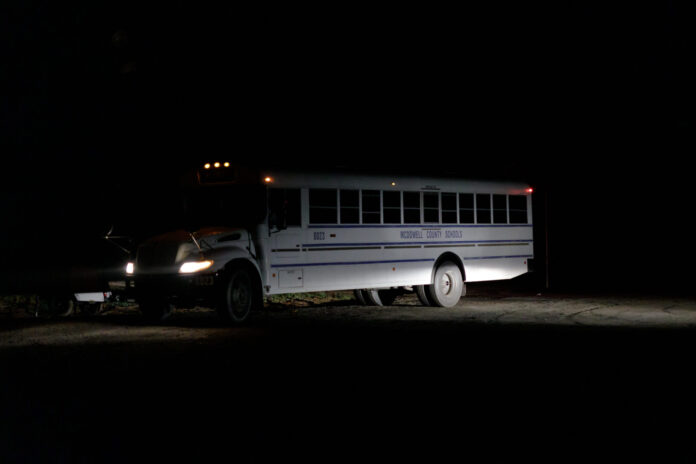This story was produced by The Hechinger Report, a nonprofit, nonpartisan news outlet focused on education.
It was 5:45 a.m. when three buses with “McDowell County Schools” painted on their sides rumbled through the mist into the gravel lot at Sandy Andrews Park. Starlight revealed the silhouettes of large oak trees lying on their sides, ripped from the earth by a storm that had dropped 40 trillion gallons of water across the Southeast just five weeks earlier.
When the buses filled up over the course of an hour, it wasn’t with students.
Instead, adults who work at the local plant of Baxter International, a medical supply company that produces 60 percent of the United States’ bags of intravenous fluid, filed in to get dropped off at the factory, whose parking lot had been destroyed by flooding.

For a month, this is how Melissa Sisk, a receptionist at nearby North Cove Elementary School who also drove one of the buses, started her mornings. After she dropped off the last Baxter employee around 7 a.m., she went to North Cove to run the front desk. At 5:30 p.m., she drove the bus to the factory to transport workers back to their cars at the park. For Sisk, it amounted to a workday spanning more than 14 hours. At the end of it, she retreated home to collapse before starting it all again the next day.
The McDowell County district’s efforts to keep the county operating likely blunted the fallout from late September’s Hurricane Helene, county officials said. Following the storm, Baxter and officials at the 5,500-student district came up with a plan to transport employees before and after school hours. The temporary transportation plan came into place even as the school district was dealing with damage to its own facilities.

The plant, which employs about 2,500 people, is a huge part of not only McDowell County’s economy, but of the national medical supply chain. The factory’s shutdown had triggered immediate shortages of IV fluid at hospitals and delayed medical procedures nationwide.
For weeks after Helene, schools were at the center of recovery for this small mountain community: Classrooms became emergency food distribution sites; school parking lots became fueling stations for emergency responders; and bus drivers transported factory employees. The crisis showcased how the role of public schools in a rural Appalachian community goes far beyond providing classroom learning.
“They stepped up, and really in some areas that aren’t educational at all,” McDowell County Manager Ashley Wooten said.
When Helene swept through McDowell County and the rest of Western North Carolina in late September, it crushed homes and sent mud pouring through the halls of an elementary school, Old Fort, that is only four years old. Baxter’s factory was completely flooded.

Baxter officials initially told the county it would likely take them four months to get the plant up and running again. Instead, it was only a matter of weeks before production of IV fluids resumed.
The McDowell County school system became the only source of fuel for emergency vehicles and generators in the area by distributing thousands of gallons from its reserves. Critical operations like the county’s water treatment plant were able to run on generators because the school district provided a fuel truck. Area residents filled their gas-powered chainsaws with the district’s fuel and cleared the thousands of downed trees that covered homes and roadways.

In turn, people from all corners of the community showed up to the county’s emergency operations center to help the schools in some way, whether by dropping off donations or sawing fallen trees, said Amy Dowdle, director of human resources at McDowell County Schools.
“We were able to account for all of our families that week after the storm, which was a huge relief,” Dowdle said. “A lot of them had lost everything, but our kiddos themselves were safe.”
A few days after Helene, the school district was already planning to resume classes the following week. Along with providing child care for parents dealing with the aftermath of the storm, Dowdle said, district leaders wanted to provide some normalcy for students and staff as the community dealt with unimaginable destruction.
The plant’s location in this small mountain community isn’t an accident: The factory sits on an aquifer that supplies the millions of gallons of water a day needed to manufacture the intravenous fluids, said Kim Effler, president of the McDowell County Chamber of Commerce.
That water supply is critical to the plant’s operation, but the abundance of water around the plant is also what ultimately caused the most damage to the factory’s building and parking lot.
The storm broke a levee near Baxter and dumped 4 feet of water into the 1.4 million-square-foot facility. The plant’s closure ultimately affected communities far beyond McDowell County’s border — hospitals in every corner of the country delayed surgeries to conserve intravenous fluid because of the shortage the flooding caused.
“We didn’t realize until it made national headlines that there’s an IV shortage all over,” Effler said. “When we saw this national IV shortage and conservation of IV fluids because our operation went down, we realized our big contribution to the nation.”

One of the biggest challenges to getting employees back on campus was the plant’s parking lot, which was destroyed by Helene. Baxter not only had to get regular employees back to work, hundreds of additional out-of-town workers arrived to help clear the damage. Just days after the storm, the plant and school district came up with the solution of having Sisk and other school bus drivers ferry employees back and forth to the factory, even as schools were in the process of opening their own doors to students. Baxter quickly made the decision to continue to pay its employees during the disaster recovery, and the company also funded the fuel for the buses and the overtime hours for the school district’s bus drivers.
“As parking lots at our facility were damaged by the storm, for several weeks, McDowell County Schools provided bus services for our employees from temporary parking lots to the plant,” Baxter said in a statement. “We are so appreciative of this support to help our employees return to work during that period and are pleased to share that employees are now able to park near the site.”
In early November, Baxter reported that it is at about 50 percent of its normal operating capacity at the McDowell County plant. A few weeks later, the plant shipped its first batch of intravenous fluid that was produced after the story, with Health and Human Services Secretary Xavier Becerra on hand to see the supply trucks leaving the factory. Baxter’s CEO said he expects the plant to be fully operational by the start of the new year.
Even as the plant returns to normal, the surrounding community faces a long recovery. North Cove Elementary, where Sisk works, is a rural school of about 225 students, 60 percent of whom come from low-income families. Several of those families lost their homes, and a few are living in houses without heat or electricity because they can’t afford to move, Principal Adam Wiseman said. School staff have been visiting students’ homes frequently to check on them. Now when it rains, some students and staff get anxious.

“There’s an emotional side to this too that a lot of people don’t really see,” Wiseman said.
North Cove has former students who work at the Baxter plant, and some of them have children of their own in McDowell County Schools. The 70-plus-hour work weeks were worth it to help those families out, Sisk said.
“It boils down to taking care of each other. That was my way of helping not only my community, but my students here, their families,” Sisk said. “It’s what’s right. It was just my part. There’s so many people that have done so much, and it was just my little part of helping.”
For two decades before becoming the school’s receptionist, Sisk was a teacher’s assistant and drove morning bus routes. Now, along with running the front desk and driving a morning route, she spends most mornings providing English language intervention sessions to a small group of students. A lot of the staff at North Cove Elementary have more than one job.
After Sisk dropped the Baxter employees off on Nov. 7, it was pajama day at North Cove Elementary. A girl in pink pajamas walked behind Sisk’s desk so she could put a Band-Aid on her arm. Both the girl and her mom were former students in Sisk’s classroom. She said she still thinks of the students who pass through her care as her children.
“We’re just a big family, and we take care of each other. If there’s a need, we really try to help each other out as much as we can,” Sisk said.





